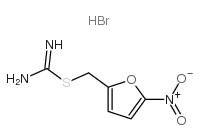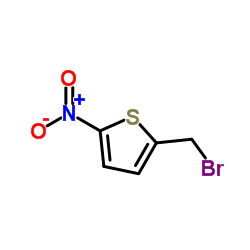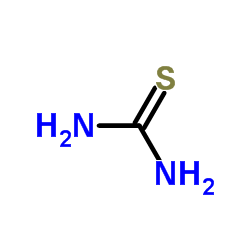(5-NITRO-2-FURYL)METHYL AMINOMETHANIMIDOTHIOATE HYDROBROMIDE

(5-NITRO-2-FURYL)METHYL AMINOMETHANIMIDOTHIOATE HYDROBROMIDE structure
|
Common Name | (5-NITRO-2-FURYL)METHYL AMINOMETHANIMIDOTHIOATE HYDROBROMIDE | ||
|---|---|---|---|---|
| CAS Number | 82118-18-1 | Molecular Weight | 282.11500 | |
| Density | N/A | Boiling Point | 366.2ºC at 760 mmHg | |
| Molecular Formula | C6H8BrN3O3S | Melting Point | 183ºC | |
| MSDS | N/A | Flash Point | 175.3ºC | |
| Name | (5-nitrofuran-2-yl)methyl carbamimidothioate,hydrobromide |
|---|---|
| Synonym | More Synonyms |
| Boiling Point | 366.2ºC at 760 mmHg |
|---|---|
| Melting Point | 183ºC |
| Molecular Formula | C6H8BrN3O3S |
| Molecular Weight | 282.11500 |
| Flash Point | 175.3ºC |
| Exact Mass | 280.94700 |
| PSA | 134.13000 |
| LogP | 3.59580 |
Synonym:2-Amidinothiomethyl-5-nitrofuran hydrobromid Section 2 - COMPOSITION, INFORMATION ON INGREDIENTS
Risk Phrases: 20/21/22 36/37/38 Section 3 - HAZARDS IDENTIFICATION EMERGENCY OVERVIEW
Harmful by inhalation, in contact with skin and if swallowed. Irritating to eyes, respiratory system and skin. Potential Health Effects Eye: Causes eye irritation. Skin: Causes skin irritation. Harmful if absorbed through the skin. Ingestion: Harmful if swallowed. May cause irritation of the digestive tract. Inhalation: Harmful if inhaled. Causes respiratory tract irritation. Chronic: Not available. Section 4 - FIRST AID MEASURES Eyes: Flush eyes with plenty of water for at least 15 minutes, occasionally lifting the upper and lower eyelids. Get medical aid. Skin: Get medical aid. Flush skin with plenty of water for at least 15 minutes while removing contaminated clothing and shoes. Ingestion: Get medical aid. Wash mouth out with water. Inhalation: Remove from exposure and move to fresh air immediately. If not breathing, give artificial respiration. If breathing is difficult, give oxygen. Get medical aid. Notes to Physician: Treat symptomatically and supportively. Section 5 - FIRE FIGHTING MEASURES General Information: As in any fire, wear a self-contained breathing apparatus in pressure-demand, MSHA/NIOSH (approved or equivalent), and full protective gear. Extinguishing Media: Use water spray, dry chemical, carbon dioxide, or chemical foam. Section 6 - ACCIDENTAL RELEASE MEASURES General Information: Use proper personal protective equipment as indicated in Section 8. Spills/Leaks: Vacuum or sweep up material and place into a suitable disposal container. Section 7 - HANDLING and STORAGE Handling: Avoid breathing dust, vapor, mist, or gas. Avoid contact with skin and eyes. Storage: Store in a cool, dry place. Store in a tightly closed container. Section 8 - EXPOSURE CONTROLS, PERSONAL PROTECTION Engineering Controls: Facilities storing or utilizing this material should be equipped with an eyewash facility and a safety shower. Use adequate ventilation to keep airborne concentrations low. Exposure Limits CAS# 82118-18-1: Personal Protective Equipment Eyes: Not available. Skin: Wear appropriate protective gloves to prevent skin exposure. Clothing: Wear appropriate protective clothing to prevent skin exposure. Respirators: Follow the OSHA respirator regulations found in 29 CFR 1910.134 or European Standard EN 149. Use a NIOSH/MSHA or European Standard EN 149 approved respirator if exposure limits are exceeded or if irritation or other symptoms are experienced. Section 9 - PHYSICAL AND CHEMICAL PROPERTIES Physical State: Solid Color: tan Odor: Not available. pH: Not available. Vapor Pressure: Not available. Viscosity: Not available. Boiling Point: Not available. Freezing/Melting Point: 183 - 185 deg C Autoignition Temperature: Not available. Flash Point: Not available. Explosion Limits, lower: Not available. Explosion Limits, upper: Not available. Decomposition Temperature: Solubility in water: Specific Gravity/Density: Molecular Formula: C6H8BrN3O3S Molecular Weight: 282 Section 10 - STABILITY AND REACTIVITY Chemical Stability: Not available. Conditions to Avoid: Incompatible materials. Incompatibilities with Other Materials: Oxidizing agents, bases. Hazardous Decomposition Products: Nitrogen oxides, carbon monoxide, oxides of sulfur, carbon dioxide, hydrogen bromide, bromine. Hazardous Polymerization: Has not been reported Section 11 - TOXICOLOGICAL INFORMATION RTECS#: CAS# 82118-18-1 unlisted. LD50/LC50: Not available. Carcinogenicity: (5-Nitro-2-furyl)methyl aminomethanimidothioate hydrobromide - Not listed by ACGIH, IARC, or NTP. Section 12 - ECOLOGICAL INFORMATION Section 13 - DISPOSAL CONSIDERATIONS Dispose of in a manner consistent with federal, state, and local regulations. Section 14 - TRANSPORT INFORMATION IATA Shipping Name: TOXIC SOLID, ORGANIC, N.O.S.* Hazard Class: 6.1 UN Number: 2811 Packing Group: III IMO Shipping Name: TOXIC SOLID, ORGANIC, N.O.S. Hazard Class: 6.1 UN Number: 2811 Packing Group: III RID/ADR Shipping Name: TOXIC SOLID, ORGANIC, N.O.S. Hazard Class: 6.1 UN Number: 2811 Packing group: III Section 15 - REGULATORY INFORMATION European/International Regulations European Labeling in Accordance with EC Directives Hazard Symbols: XN Risk Phrases: R 20/21/22 Harmful by inhalation, in contact with skin and if swallowed. R 36/37/38 Irritating to eyes, respiratory system and skin. Safety Phrases: S 26 In case of contact with eyes, rinse immediately with plenty of water and seek medical advice. S 36/37/39 Wear suitable protective clothing, gloves and eye/face protection. WGK (Water Danger/Protection) CAS# 82118-18-1: No information available. Canada None of the chemicals in this product are listed on the DSL/NDSL list. CAS# 82118-18-1 is not listed on Canada's Ingredient Disclosure List. US FEDERAL TSCA CAS# 82118-18-1 is not listed on the TSCA inventory. It is for research and development use only. SECTION 16 - ADDITIONAL INFORMATION N/A |
| Hazard Codes | Xn:Harmful; |
|---|---|
| Risk Phrases | R20/21/22;R36/37/38 |
| Safety Phrases | S26-S36/37/39 |
| HS Code | 2932190090 |
|
~94% 
(5-NITRO-2-FURY... CAS#:82118-18-1 |
| Literature: Usova, E. B.; Krapivin, G. D.; Kul'nevich, V. G. Chemistry of Heterocyclic Compounds (New York, NY, United States), 1990 , vol. 26, # 4 p. 477 - 482 Khimiya Geterotsiklicheskikh Soedinenii, 1990 , # 4 p. 557 - 562 |
|
~91% 
(5-NITRO-2-FURY... CAS#:82118-18-1 |
| Literature: Kazimierczuk, Zygmunt; Chalimoniuk, Malgorzata; Laudy, Agnieszka Ewa; Moo-Puc, Rosa; Cedillo-Rivera, Roberto; Starosciak, Bohdan Jerzy; Chrapusta, Stanislaw J. Archives of Pharmacal Research, 2010 , vol. 33, # 6 p. 821 - 830 |
|
~% 
(5-NITRO-2-FURY... CAS#:82118-18-1 |
| Literature: Krapivin, G. D.; Usova, E. B.; Kul'nevich, V. G. Chemistry of Heterocyclic Compounds (New York, NY, United States), 1985 , vol. 21, # 2 p. 230 Khimiya Geterotsiklicheskikh Soedinenii, 1985 , vol. 21, # 2 p. 272 |
| HS Code | 2932190090 |
|---|---|
| Summary | 2932190090 other compounds containing an unfused furan ring (whether or not hydrogenated) in the structure VAT:17.0% Tax rebate rate:9.0% Supervision conditions:none MFN tariff:6.5% General tariff:20.0% |
| (5-Nitrofuran-2-yl)methyl carbamimidothioate hydrobromide |
| S-2-(5-nitrofuran-2-ylmethyl)isothiourea hydrobromide |



